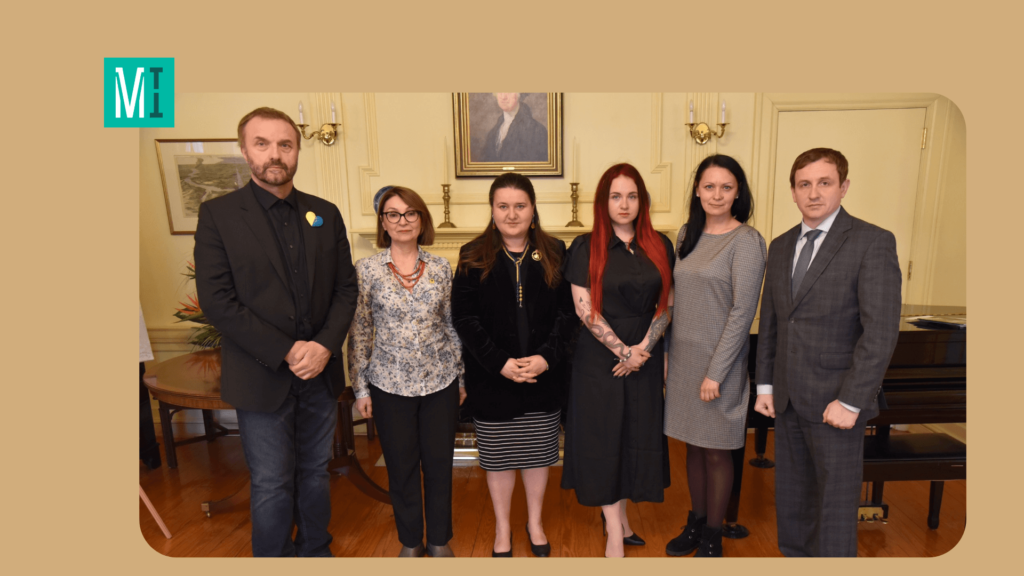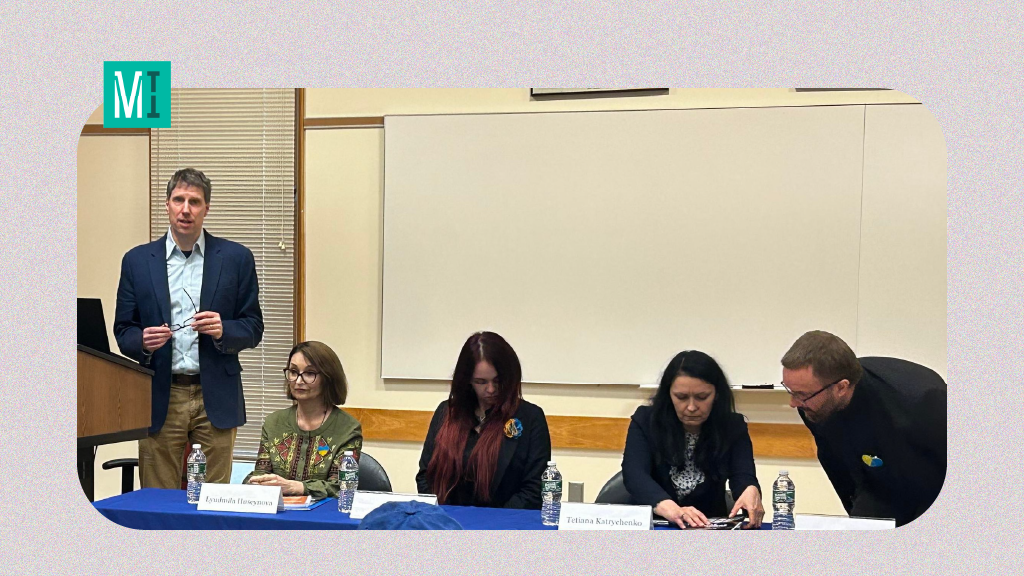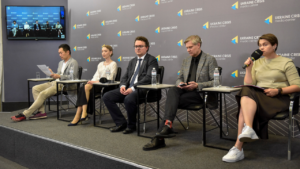MIHR in the US called for the creation of a special negotiating platform for the release of civilians held by Russia

In February and March, the Media Initiative for Human Rights took an advocacy trip to the United States. MIHR coordinator Tetiana Katrychenko, together with former civilian hostage Lyudmila Huseynova and former prisoner of war Anna Olsen, visited New Haven, New York, and Washington, where they met with scientists, diplomats, and politicians.
The program began with a panel discussion at Yale University, “Women in Russian Captivity: Aggression Against Ukraine and Violations of International Law,” with the participation of David Simon, Senior Lecturer in Global Affairs and Director of the Genocide Studies Program at Yale University Department of Political Science.
“Since 2014, we have been talking about thousands of Ukrainians detained for political reasons, including dozens of women. They posted in support of Ukraine on social networks, did not agree to cooperate with Russia and its proxy formations, and helped wounded soldiers who were captured. After February 24, 2022, the number of detained women increased. First, we can talk about the female military. Currently, 41,000 of them are serving in the Ukrainian army. According to rough estimates, about 500 were captured. Secondly, we are talking about civilians. It is difficult to name the number of detainees — in the occupied territories of the Donetsk, Luhansk, Kherson, and Zaporizhzhia regions, detention may occur now. Even the Ukrainian government does not have accurate data on detained civilians in connection with Russia’s aggression. Because some do not have the opportunity to report the detention, and others fear persecution. But we can talk about several hundred. We estimate that 161 women have been released in the 12 months since the full-scale invasion. Two of them are here with us — Anna Olsen and Lyudmila Huseynova,” Tetyana Katrychenko said.

Discussion at Yale University
Lyudmila and Anna shared their own experience of captivity. Anna talked about torture, threats, and sexual violence to which prisoners are subjected. “When I was taken for the so-called interrogations, there was only one answer to my question about why I was detained: “Because you are Ukrainians, because you do not want to return to the Soviet Union, and simply because we want so.” Lyudmila Huseynova was held in Isolation, a former cultural center of Donetsk, which the occupiers converted into a prison. She spoke about the brutal treatment and threats of sexual violence by the guards.
On February 22, Tetiana Katrychenko and Lyudmila Huseynova took part in a high-level event at the UN Headquarters dedicated to Russia’s gross human rights violations, war crimes, and crimes against humanity during the war against Ukraine. In her speech, Tetiana Katrychenko stated about the systematic violations of human rights that Russia purposefully commits on Ukrainian territory, abducting civilians, holding them in its prisons, and torturing them. “In total, we counted 921 civilians currently being held in the occupied territories of Ukraine and the territory of the Russian Federation. But this number can be at least 5–7 times higher. They are hidden from the outside world; Russians do not provide information about their condition to their families or the state,” she said.
Katrychenko also emphasized that only prisoners of war could be exchanged. Therefore, Ukraine needs a special mechanism to help it return civilians from Russian captivity. Such a mechanism can be a platform with the involvement of high-level negotiators.
Lyudmila Huseynova, who has survived Russian captivity, asked to help liberate Ukrainian women whom Russia is detaining in its territory and the occupied territories of Ukraine. pic.twitter.com/y8vV819nuq
— Media Initiative for Human Rights (@mihr_ua) February 23, 2023
The topic of the release of civilian hostages and the creation of a special mechanism for this was also discussed by the participants of the trip during advocacy meetings with diplomats of the Permanent Missions of Canada and Hungary to the UN, leading scientists specializing in human rights violations and genocide, as well as members of the New York State Bar Association.
On February 24, the anniversary of the full-scale Russian invasion, Katrychenko, Huseynova, and Olsen participated in an event at the Ukrainian Institute of America. Special guests were James Cleverly, Secretary of State for Foreign, Commonwealth, and Development Affairs of the United Kingdom, his Estonian counterpart Urmas Reinsalu, Kathy Hochul, Governor of New York, and Congresswoman Marcy Kaptur. Anna Olsen and Lyudmila Huseynova spoke about their experience of being held captive, emphasizing the need to support Ukraine in its efforts to free the Kremlin’s civilian hostages and prisoners of war.
The topic of the liberation of civilian and military women was heard during the meeting with the Union of Ukrainian Women of America, other women’s and public organizations in New York, and the Ukrainian community.
The MIHR coordinator and the survivors had important meetings in Washington, DC. They met with US congressmen Marcy Kaptur and Mike Quigley, members of the Congressional Ukrainian Caucus, and the assistant to William Keating, a US congressman who initiated a draft resolution calling for the creation of a special tribunal on the crime of aggression against Ukraine. Also, conversations were held with representatives of the Ministry of Justice, which investigates crimes related to Russia’s aggression, the Commission on Security and Cooperation in Europe, and the US State Department, in particular, Tom Salinger, Europe Director in the Bureau of Democracy, Human Rights and Labor.

MIHR has presented their report on women in Russian captivity to the Congresswoman Marcy Kaptur
At all meetings, MIHR talked about the need to release Ukrainian civilians who were captured by Russia and are being held in territories controlled by it or in Russian prisons and about creating a special negotiation platform for this purpose. Attention was also paid to the fact that representatives of the ICRC do not have access to prisoners of war, their activity is insufficient, and sometimes the ICRC compromises with the Russian Federation.
“We can still understand why the representatives of the ICRC do not come to the places of detention of prisoners of war in the occupied territories, but we do not find an explanation at all why they do not try to come to the colonies in the Russian Federation?! There is no danger to their lives there. They just don’t want to. During my captivity, I was transported throughout Russia several times, and in no institution did I see representatives of the ICRC. Due to the fact that they do not go there, the prisoners of war are subjected to torture and abuse. We must ensure that control over places of detention, conditions, and provision of medical care is established,” said Anna Olsen at one of the meetings.

During the meeting with the Commission on Security and Cooperation in Europe
The same challenges were discussed with representatives of the Carter School for Peace and Conflict Resolution at George Mason University in Washington, experts of the United States Institute of Peace, analysts of the Atlantic Council, representatives of USAID, and the National Endowment for Democracy.
The Embassy of Ukraine to the USA specially organized an event at the Ukrainian House — a public discussion on the detention of civilians and violation of the rights of prisoners of war by representatives of the Russian Federation. The event was held with the participation of representatives of the diplomatic corps, academic circles, the Ukrainian community, and mass media. It was moderated by Iryna Smolina, senior program specialist at the National Endowment for Democracy. Ambassador Oksana Markarova personally opened the discussion, noting that the topic of detaining women in connection with the armed aggression of the Russian Federation is crucial.

Meeting at the US State Department
Also, in Washington, the discussion on the analytical report “Destruction and Devastation: One Year of Russia’s Assault on Ukraine’s Health Care System” was held at the Center for Strategic and International Studies (CSIS). MIHR documenters and analysts, together with experts from Physicians for Human Rights and other organizations, contributed to this report. It documents more than 700 attacks of the Russian Federation on Ukrainian medical infrastructure and medics during the first year of full-scale war. The collected evidence gives reason to talk about the attacks as war crimes and potentially crimes against humanity.
The MIHR’s advocacy trip to the USA, with the participation of witnesses of Russian crimes against Ukraine, is an important component in strengthening the support of Ukraine by the international community for the search for mechanisms to release civilian hostages, ensuring the rights of prisoners of war, and holding Russia accountable.






